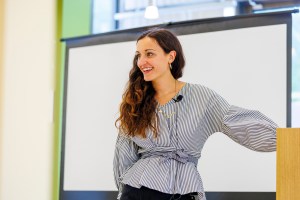Arts & Culture
-
Schlesinger exhibit turns spotlight on largely invisible past
Among the artifacts on display in a new exhibition at the Schlesinger Library are photos of Ainu and Visayan women who were displayed as “living exhibits” at the 1904 St.…
-
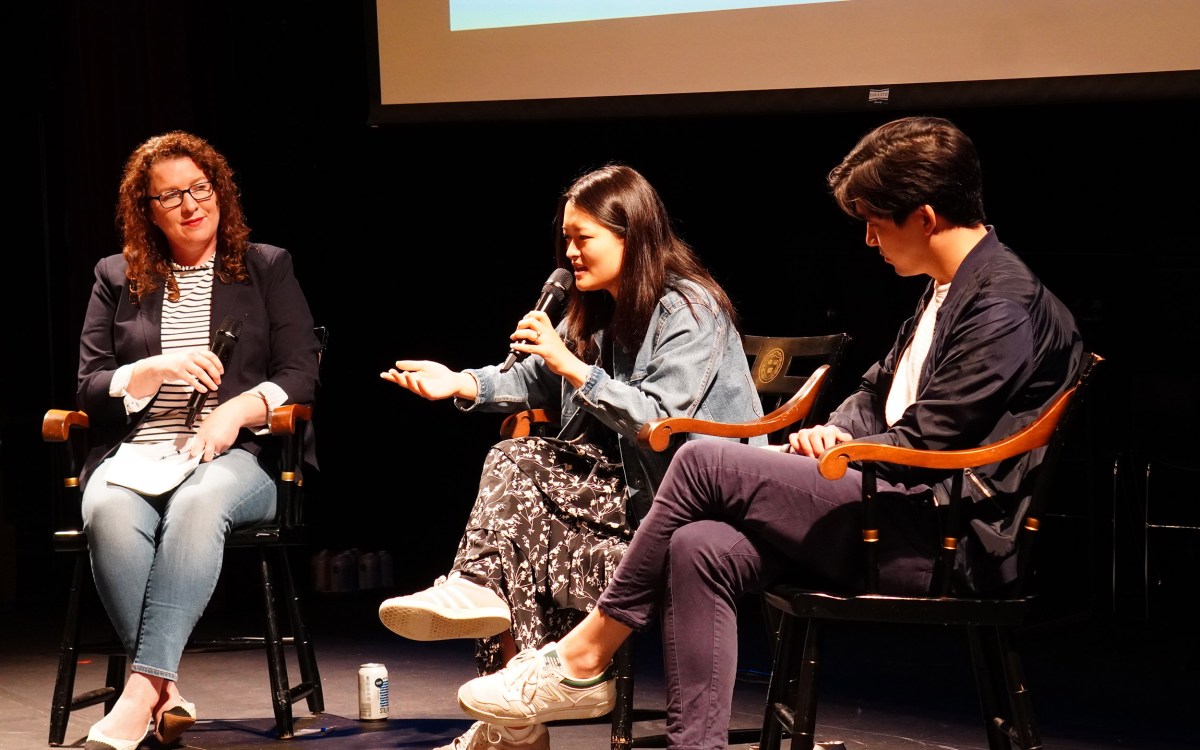
Making creation a career
Alumni in the arts share insights and lifelong impact of campus involvement
-
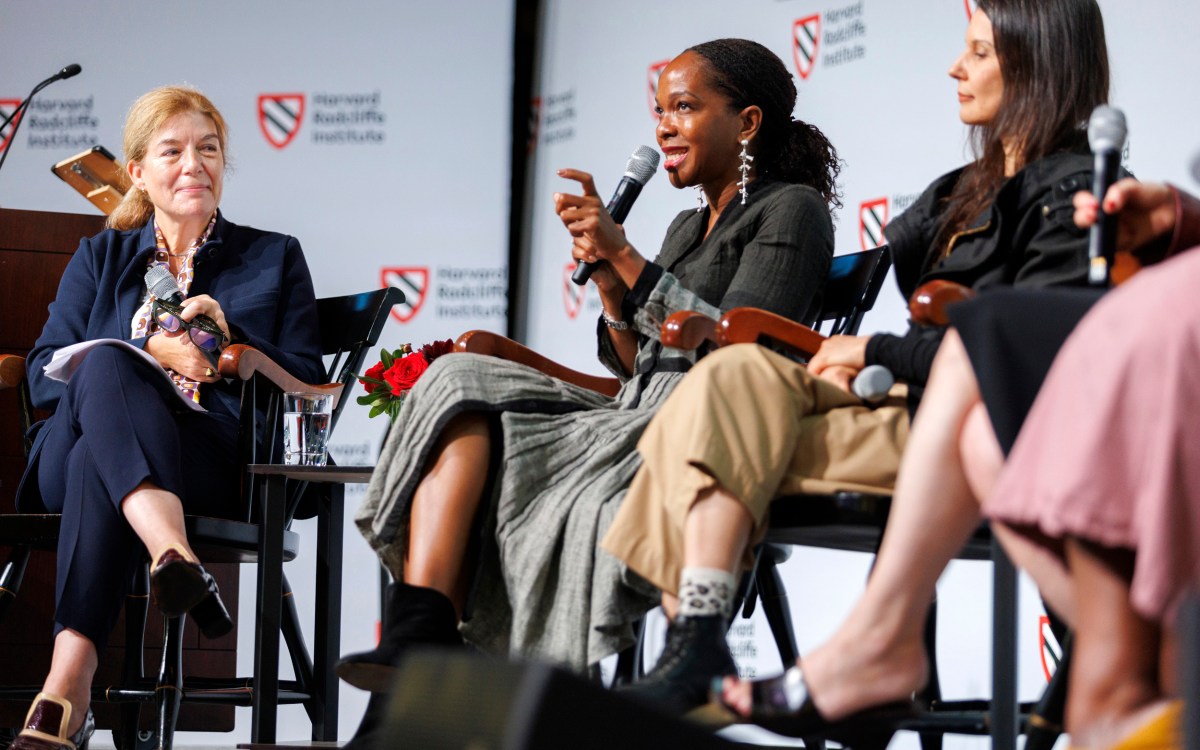
Art and Big Ideas are not strange bedfellows
Both spring from hard questions, benefit from interdisciplinary feedback, former Radcliffe fellows say
-
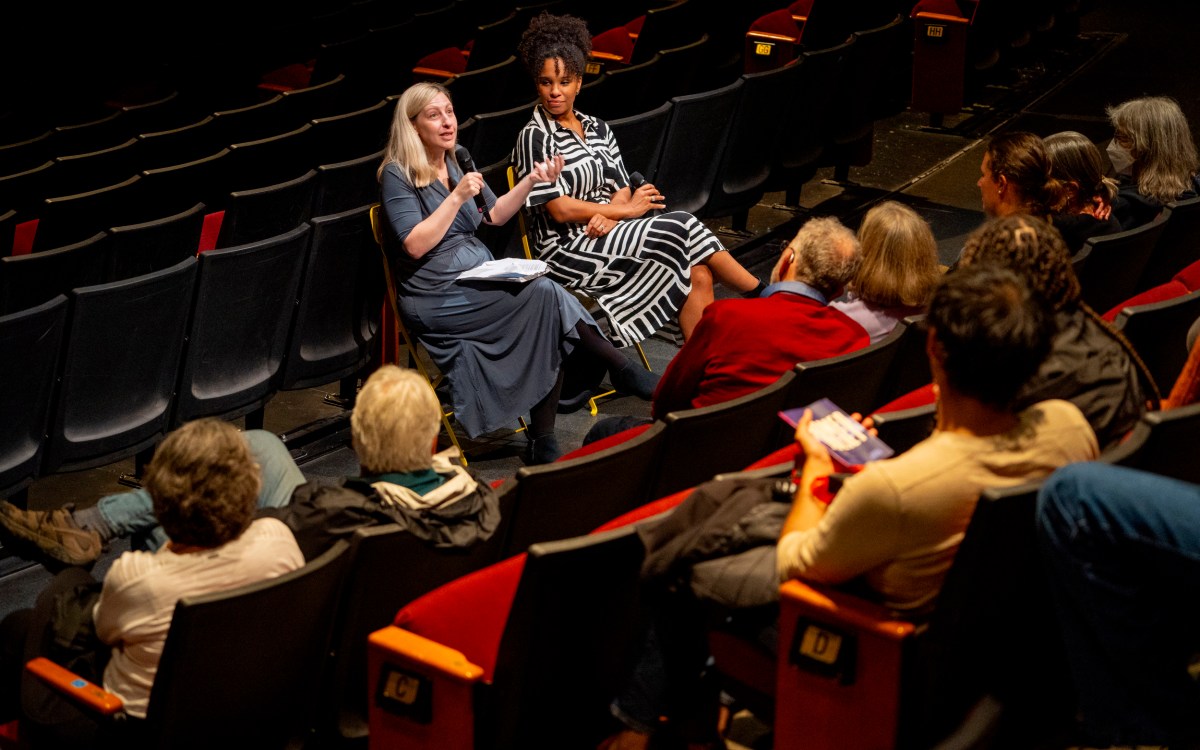
Was Romeo ‘love-bombing’ Juliet?
Globe relationship columnist sorts timeless elements of youth, love, social divisions of 16th-century classic in new A.R.T. production
-
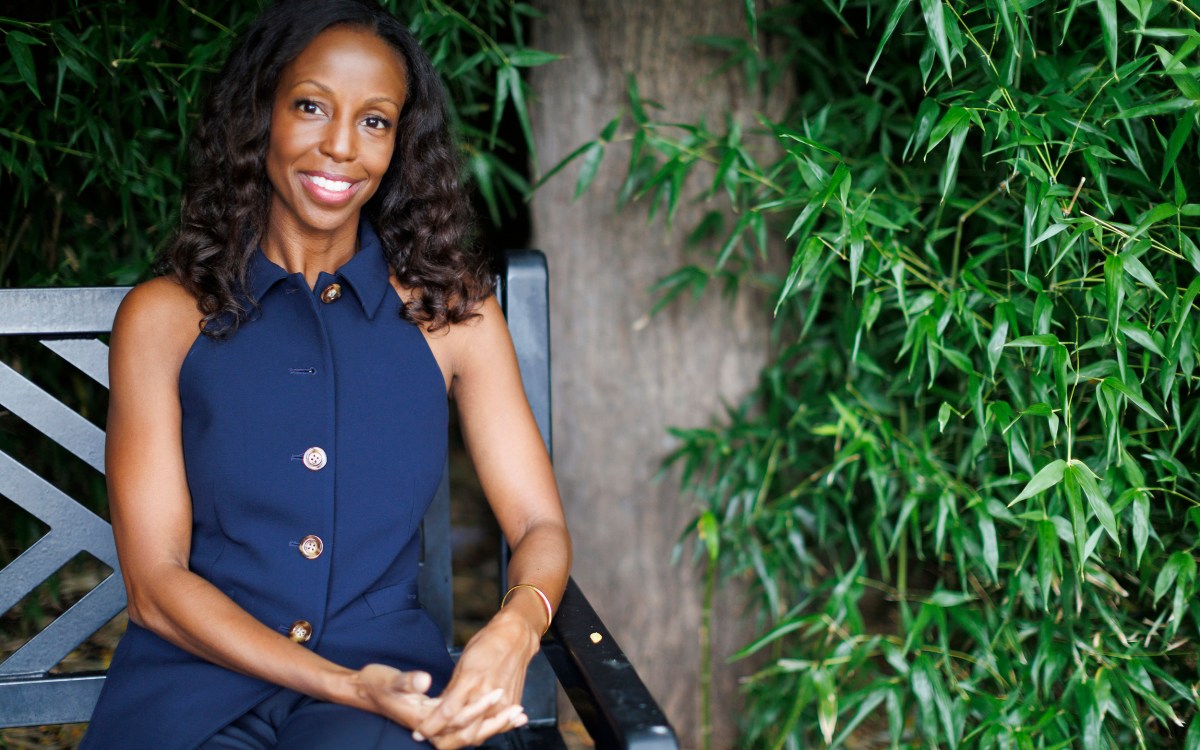
‘Unseen Truth’ shows the real picture behind ‘Caucasian’ ideals
Sarah Lewis explores the false foundation of America’s racial hierarchy in new book
-
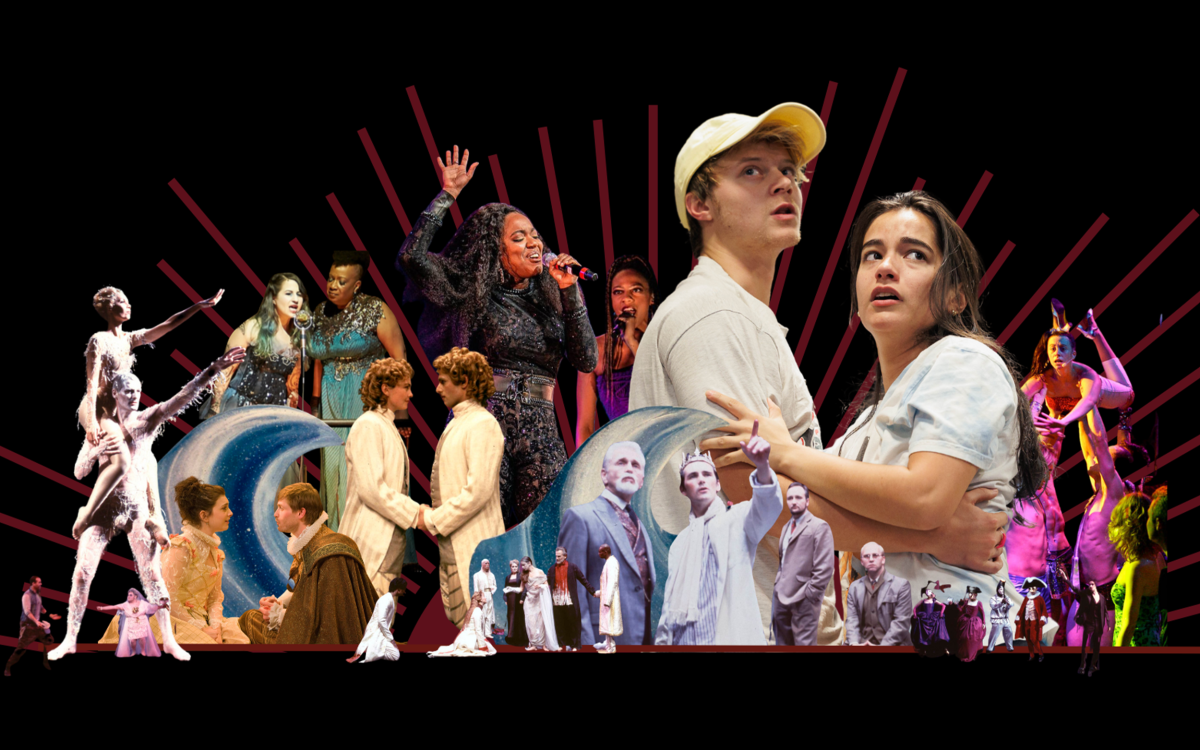
A history of Shakespeare at the A.R.T.
‘Romeo and Juliet’ is latest in long line of productions stretching back to theater’s inaugural staging in 1980 of ‘A Midsummer Night’s Dream’
-
New Trajectories: contemporary architecture in Croatia and Slovenia
For young architects, the moment their country is dissolving may not be a bad time to launch their careers. That has to be one of the takeaway messages from “New Trajectories: Contemporary Architecture in Croatia and Slovenia,” an exhibition at the Gund Hall Gallery of the Harvard Graduate School of Design (GSD) through Oct. 5.
-
Christo and Jeanne-Claude discuss art of the deal
The dynamic husband and wife artistic team of Christo and Jeanne-Claude are likely better negotiators than many foreign leaders. The pair is best known for their massive art installations, often using nylon or woven fabric to highlight buildings or works of nature. Their most recent project (2005), “The Gates,” consisted of 7,503 16-foot-tall steel gates with suspended swaths of saffron-colored nylon that snaked through 23 miles of paths in Central Park.
-
Radcliffe Fellow Markovits talks about ‘mad, bad, dangerous’ poet
George Gordon, Lord Byron died in 1824 at the age of 36 — a short life, but long enough for Byron to become a personage so vivid and controversial that he was arguably the modern era’s first celebrity.
-
‘Grace in the Dark’
In her one-woman shows, Tony- and Pulitzer-nominated writer and actress Anna Deavere Smith spins interviews into a theatrical performance. Weaving the words she has collected into an evocative tapestry, she brings to life characters ranging from a photographer in Iraq to a Harvard theologian to a Kentucky Derby jockey to a Rwanda genocide survivor.
-
J.J. Audubon the beginner featured in new book
Although the name John James Audubon is synonymous with beautifully detailed, scientifically accurate drawings of birds, many of his early drawings were destroyed by Audubon himself, but an intriguing selection remains in the collections of Harvard’s Houghton Library and the Ernst Mayr Library of the Museum of Comparative Zoology (MCZ).
-
Student curators highlight American Indian cultural ‘Remix’
Kelsey Leonard grew up on New York’s Long Island, bombarded by society’s common images of American Indians that included casino owners, alcoholics, and basket-weaving natives.
-
Harvard’s Department of Music announces fellows and award winners
Harvard’s Department of Music recently announced a host of fellowship and award recipients. The Oscar S. Schafer Award is given to graduate students “who have demonstrated unusual ability and enthusiasm in their teaching of introductory courses, which are designed to lead students to a growing and lifelong love of music.”
-
Peabody awards Gardner Fellowship to Singh
The Peabody Museum of Archaeology and Ethnology has announced that Dayanita Singh of New Delhi, India, has been awarded the Robert Gardner Fellowship in Photography.
-
Bhabha, matchmaker of disciplines
Homi K. Bhabha is a marriage counselor of sorts — a literary scholar with a wide range of intellectual appetites whose role is to bring together a diversity of scholars.
-
The Russian bells: A multifaceted love story
The saga of the Lowell House bells, scheduled to return to Russia this summer after 78 years at Harvard, was the subject of a festival and symposium Sunday and Monday (June 1-2) at Lowell House and the Barker Center.
-
Maggie Spivey: Archaeologist, comedian, princess
Walk past Maggie Spivey in the Yard or on the streets of Cambridge, and you might find her with head down, eyes glued to the ground. She’s not being anti-social, or lamenting a flubbed grade — this dynamic archaeology concentrator just knows that often the most fascinating stories can be found underfoot.
-
Beatrice Viramontes is a maestro of gigs and digs
Despite her roots in the primarily Mexican-American East L.A. and a father who played traditional Mexican music on his guitar, Beatrice Viramontes says it “stressed her out” when her father performed at family parties and asked her to sing.
-
Changing lives with music and science
When Bong-Ihn Koh’s mother brought home a cello piece by mistake, the young Koh got his hands on it and was hooked.
-
The magic of J.K. Rowling
J.K. Rowling inspires the Class of 2008 with a heartfelt, fluent talk about the uses of failure and imagination.
-
Student work graces Mass Hall
Bringing home (literally) Harvard’s newly invigorated commitment to the arts, President Drew Faust has opened up Massachusetts Hall to an exhibition of selected artwork by talented undergraduates.
-
Acclaimed architect Renzo Piano to design major Fogg renovation
There are many reasons to love the Harvard Art Museum. For one, an extensive collection of art transports you from ancient times into the present. Then there is the signature design of the Fogg Museum building at 32 Quincy St., with its evocative courtyard, modeled after the 16th century facade of a home in Montepulciano, Italy.
-
Europe travels to Safavid Iran at Houghton
Houghton Library’s newest exhibition — “From Rhubarb to Rubies: European Travels to Safavid Iran (1550-1700)” — explores European travel to Safavid Iran in the years 1550 to 1700, a time marked by significant cultural and scientific exchange between the two regions.
-
Diane Paulus appointed artistic director of the American Repertory Theatre
Harvard University and the American Repertory Theatre (A.R.T.) announced today (May 16) the appointment of Diane Paulus as artistic director. She will be the third artistic leader of the A.R.T., following founding director Robert Brustein (1980–2002) and Robert Woodruff (2002–07).
-
Photographs reveal tiny leaf details
The sense of loss Amanda Means felt is exposed in a new exhibit of her unusual photographs of leaves at the Harvard Museum of Natural History. Called “Looking at Leaves,” the exhibit is the third in a series of photographic exhibitions at the museum that explore the intersection of art and science by inviting visitors to look closely at the world around them.
-
Yearlong search for the ‘human’ concludes with Bhabha address
The series “Rethinking the Human,” a yearlong exploration of the very nature of what it means to be human, sponsored by the Harvard Divinity School’s Center for the Study of World Religions, concluded last week (May 12-13) with a two-day symposium.
-
Bhabha named senior adviser
Homi K. Bhabha has just been named senior adviser on the humanities to the president and provost. The position, a first for the University, takes effect July 1.
-
Reminiscences of Maxim Gorky
In 1895, Russian journalist Alexei Maximovich Peshkov, a onetime shoemaker’s apprentice who had quit school at 10, adopted a new name: Maxim Gorky. After that, literary fame came fast and furious for this self-taught, fresh-voiced grandson of a Volga boatman. Gorky — the name means “bitter” — could tell a story, remember everything he read or heard, and had the energy of 10 men.
-
The fleeting nature of performance
Christine Whitney Dakin, a New York City contemporary dancer and protégé of Martha Graham, is a Radcliffe Fellow this year — the first dancer ever in the program. She’s busy writing a book, making a film, and preparing a Harvard class for next spring.
-
Radcliffe Fellow, poet Elizabeth Alexander reads
It was show and tell for poet Elizabeth Alexander this week. The Yale University professor of African American studies, a Radcliffe Fellow this year, used a May 5 reading to show the depth and musicality of her poems, short stories, and penetrating essays — and to tell the story of inspiration’s multiple avenues.
-
Ghostly Shakespearean fragment comes to life on stage
Monday evening (May 5) at Zero Arrow Theatre, an audience of 120 listened in on a discussion of “Cardenio,” a play premiering Saturday (May 10) at the American Repertory Theatre (A.R.T.).
-
Rain doesn’t dampen spirit of Arts First
It was a rainy (not to say explosive) weekend, yet despite the daunting weather, the arts not only endured but prevailed at the University as dance, song, theater, and conceptual art brightened up the Yard and its environs.
-
Distinguished poet visits alma mater
Adrienne Rich, one of America’s most lauded poets and a major literary voice of the 20th century, returned to the place where it all began on a recent dreary Monday…
-
OfA awards students for excellence in the arts
The Office for the Arts at Harvard (OfA) and the Council on the Arts at Harvard, a standing committee of the Faculty of Arts and Sciences, recently announced the winners of the annual undergraduate arts prizes presented in recognition of outstanding accomplishment in the arts for the 2007-08 academic year.
-
‘Instability and Decomposition’
Instability is the reign of things erratic and unpredictable. Decomposition is the state of being as it unravels, nicely captured by a common sentiment: Things fall apart. The two words — and the frictive, unstable worlds they imply — were at the heart of a convocation of young scholars last week (April 25-26).
-
Lucky shot? Photography and chance
Chance smiled on Joe Rosenthal in late February 1945. The young Associated Press photographer was atop Mount Suribachi to cover the Allied troops’ capture of Iwo Jima when he heard that soldiers were preparing to raise an American flag. It was the second attempt of the day, for authorities had decided the first flag — placed a few hours earlier — was too small.
